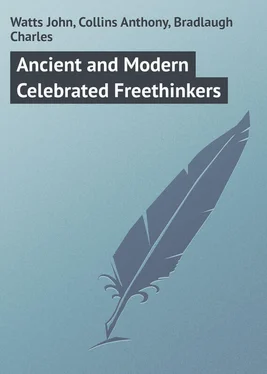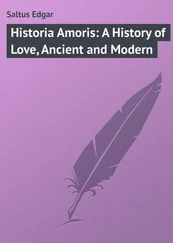Charles Bradlaugh - Ancient and Modern Celebrated Freethinkers
Здесь есть возможность читать онлайн «Charles Bradlaugh - Ancient and Modern Celebrated Freethinkers» — ознакомительный отрывок электронной книги совершенно бесплатно, а после прочтения отрывка купить полную версию. В некоторых случаях можно слушать аудио, скачать через торрент в формате fb2 и присутствует краткое содержание. ISBN: , Жанр: foreign_language, foreign_prose, на английском языке. Описание произведения, (предисловие) а так же отзывы посетителей доступны на портале библиотеки ЛибКат.
- Название:Ancient and Modern Celebrated Freethinkers
- Автор:
- Жанр:
- Год:неизвестен
- ISBN:http://www.gutenberg.org/ebooks/30200
- Рейтинг книги:5 / 5. Голосов: 1
-
Избранное:Добавить в избранное
- Отзывы:
-
Ваша оценка:
- 100
- 1
- 2
- 3
- 4
- 5
Ancient and Modern Celebrated Freethinkers: краткое содержание, описание и аннотация
Предлагаем к чтению аннотацию, описание, краткое содержание или предисловие (зависит от того, что написал сам автор книги «Ancient and Modern Celebrated Freethinkers»). Если вы не нашли необходимую информацию о книге — напишите в комментариях, мы постараемся отыскать её.
Ancient and Modern Celebrated Freethinkers — читать онлайн ознакомительный отрывок
Ниже представлен текст книги, разбитый по страницам. Система сохранения места последней прочитанной страницы, позволяет с удобством читать онлайн бесплатно книгу «Ancient and Modern Celebrated Freethinkers», без необходимости каждый раз заново искать на чём Вы остановились. Поставьте закладку, и сможете в любой момент перейти на страницу, на которой закончили чтение.
Интервал:
Закладка:
"Awake, my St. John, leave all meaner things
To low ambition, and the pride of kings.
Laugh when we must, be candid when you can,
And vindicate the ways of God to man."
* Cook's Life of Bolingbroke, 2nd vol., p. 97..
This is sufficient to prove the partnership in the poem, and from the generally acknowledged fact of his connection, we have no hesitation in declaring that this poem is the grand epic of Deism, and is as much the offspring of Bolingbroke, as his own ideas when enunciated by others. There is not a single argument in the Essay but what is much more elaborated in the works of Bolingbroke, while every positive argument is reduced to a few poetic maxims in the Essay. We may as well look here for Bolingbroke's creed, rather than amongst his prose works. There is, however, this difference, that in the Essay there is laid down an ethical scheme of positivism — i. e. , of everything in morals which can be duly tested and nothing more: while in the prose writings of Bolingbroke, the negative side of theology is discussed with an amount of erudition which has never been surpassed by any of the great leaders of Freethought. The first proposition of the Essay is based on a postulate, upon which the whole reasoning is built. Overthrow this substratum, and the philosophy of the Essay is overturned – admit it, and its truth is evident; it is —
"What can we reason but from what we know?"
This is equivalent to saying that we can only reason concerning man as a finite part of an infinite existence, and we can only predicate respecting what comes under the category of positive knowledge ; we are therefore disabled from speculating in any theories which have for a basis opposition to the collected experience of mankind. This was a position laid down by Bolingbroke to escape all the historical arguments which some men deduce from alleged miraculous agency in the past, or problematical prophecy in the future. It likewise shows the untenable nature of all analogy, which presumes to trace an hypothetical first cause or personal intelligence, to account for a supposed origin of primeval existence, by which nature was caused, or forms of being first evolved. Although it may be deemed inconsistent with the philosophy of Bolingbroke to admit a God in the same argument as the above, we must not forget that in all speculative reasoning there must be an assumption of some kind, which ought to be demonstrated by proof, or a suitable equivalent in the form of universal consent. Yet in the case of the God of the Essay, we look in vain for the attributes with which Theists love to clothe their God, and we can but perceive inexorable necessity in the shape of rigid and unswerving laws, collected in one focus by Pope, and dignified with the name of God; so that the difference betwixt a Deist of the old, and an Atheist of the modern school, is one of mere words – they both commence with an assumption, the Atheist only defining his terms more strictly, the subject-matter in both instances being the same. The only difference being, the one deceives himself with a meaningless word, the other is speechless on what he cannot comprehend. The Essay shows a scheme of universal gradation, composed of a series of links, which are one entwined within the other – every rock being placed in its necessitated position – every plant amidst its growth bearing an exoteric similitude to itself – every animal, from the lowest quadruped to the highest race of man, occupying a range of climate adapted to its requirements. The Essay here is scientifically correct, and agrees with the ablest writers on necessity. A German philosopher renowned alike for rigid analysis and transcendent abilities as a successful theorist, observes, "When I contemplate all things as a whole, I perceive one nature one force : when I regard them as individuals, many forces which develop themselves according to their inward laws, and pass through all the forms of which they are capable, and all the objects in nature are but those forces under certain limitations. Every manifestation of every individual power of nature is determined partly by itself, partly by its own preceding manifestations, and partly by the manifestations of all other powers of nature with which it is connected; but it is connected with all, for nature is one connected whole. Its manifestations are, therefore, strictly necessary, and it is absolutely impossible to be other than as it is. In every moment of her duration nature is one connected whole, in every moment must every individual be what it is because all others are what they are, and a single grain of sand could not be moved from its place, without, however imperceptibly to us, changing something throughout all parts of the immeasurable whole. Every moment of duration is determined by all past moments, and will determine all future movements, and even the position of a grain of sand cannot be conceived other than it is, without supposing other changes to an indefinite extent. Let us imagine that grain of sand to be lying some few feet further inland than it actually does; then must the storm-wind that drove it in from the sea-shore have been stronger than it actually was; then must the preceding state of the atmosphere, by which this wind was occasioned, and its degree of strength being determined, have been different from what it actually was, and the preceding changes which gave rise to this particular weather, and so on. We must suppose a different temperature from that which really existed – a different constitution of bodies which influenced that temperature. How can we know that in such a state of weather we have been supposing, in order to carry this grain of sand a few yards further, some ancestors of yours might not have perished from hunger, cold, or heat, long before the birth of that son from whom you are descended, and thus you might never have been at all, and all that you have done, and all that you ever hope to do, must have been hindered, in order that a grain of sand might lie in a different place." * The whole of the first book is devoted to the necessitated condition of man in relation to the universe. In one portion there is a succession of beautiful similes, portraying the blissful state we are in, instead of being gifted with finer sensibilities, or a prescience, which would be a curse.
* Fichte's "Destination of Man," pp. 8, 9
Pope, although an ardent disciple of Bolingbroke, did not entirely forsake the prejudices of childhood; he still indulged in a bare hope of a future life, which his master, with more consistency, suppressed. So that when the poet rhymed the propositions of St. John, he pointed them with "hope" in an eternal future; for that speculation which was still probability in his day, is now nearly silenced by modern science. But we must not confound the ideas of futurity, which some of the Deists expressed, with those of Christianity. They were as different as the dreams of Christ and Plato were dissimilar. Pope "hoped" for a future life of intellectual enjoyment devoid of evil, but the heaven of the gospel is equally as necessary to be counterbalanced by a hell, as the existence of a God requires the balancing support of a devil. We therefore can sympathise with the description of a heaven, the poor Indian looked for: —
"Some safer world in depths of woods embraced,
Some happier island in the watery waste;
Where slaves once more their native land behold,
Nor fiends torment, nor Christians thirst for gold.
To be – contents his natural desires,
He asks no angels' wings, no seraphs' fires,
But thinks, admitted to that equal sky,
His faithful dog should bear him company."
Pope durst not emphatically deny the future-life theory, so he attacked it by elaborating a physical instead of a spiritual heaven. So heterodox a notion of the Indian's future sports, is not to be found in theology, especially as he pictures the Indian's sports with his dog. Here was a double blow aimed at Christianity by evolving a "positive" idea of future pleasures, and the promulgation of sentiments anti-Christian. – Again he attacks them for unwarrantable speculation in theology, when he says —
Читать дальшеИнтервал:
Закладка:
Похожие книги на «Ancient and Modern Celebrated Freethinkers»
Представляем Вашему вниманию похожие книги на «Ancient and Modern Celebrated Freethinkers» списком для выбора. Мы отобрали схожую по названию и смыслу литературу в надежде предоставить читателям больше вариантов отыскать новые, интересные, ещё непрочитанные произведения.
Обсуждение, отзывы о книге «Ancient and Modern Celebrated Freethinkers» и просто собственные мнения читателей. Оставьте ваши комментарии, напишите, что Вы думаете о произведении, его смысле или главных героях. Укажите что конкретно понравилось, а что нет, и почему Вы так считаете.












